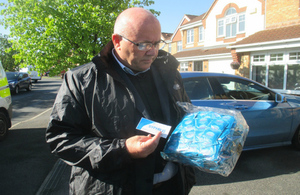Dodgy kits give dodgy results
Every year the Medicines and Healthcare products Regulatory Agency (MHRA) seize thousands of counterfeit and unlicensed condoms, STI test kits, and HIV self-test kits.

As part of FPA’s Sexual Health Week we are reminding people to be careful when ordering online and to always make sure medical devices used for sexual health has a CE mark and is bought from a legitimate online retailer.
Some products being sold online may be counterfeit and will not give adequate protection against sexually transmitted diseases (STIs) including HIV.
Approved HIV self-testing kits that carry a CE mark shows they have gone through the proper regulatory processes and, when used in accordance with their instructions, can be used safely.
Whether buying from the high street or online, only buy a self-test kit from a source that you trust. In the UK online retailers selling medicines must be registered with MHRA and display the distance selling logo on every page of their website. You can find out more about where to buy HIV test kits at HIV Aware.
According to sexual health charity FPA, there were more than 435,000 STI diagnoses in England last year and rates across the UK remain high compared to other countries in Western Europe.
In a single operation earlier this year we seized more than 22,000 counterfeit condoms being stored in a garage which were being sold online. Alongside them were over 7,000 unapproved syphilis test strips.
Cary James, Head of Health Promotion at Terrence Higgins Trust (THT), said:
Home self-test kits for HIV and STIs have many benefits, including letting people test in their own space, in their own time, on their terms. However we are extremely concerned to see unregulated products on the market and urge anyone considering a test to only use those with a CE mark.
Anyone taking a test without a CE mark risks their own health and that of others. Anyone worried about test kits should contact our helpline THT Direct, on 0808 802 1221, as should anyone who needs support after taking a test.
The presence of our logo on a test provider’s website or kit does not mean we endorse the kit. Unfortunately, unscrupulous companies sometimes use the THT logo without permission in order to give their product credibility. If you are uncertain about a test, please contact us for advice.
MHRA’s Director of Devices, John Wilkinson, said:
People who buy condoms or a self-test kit online or from the high street should buy from a reputable source. Make sure it has a CE mark and don’t use it if it’s damaged or the seal is broken.
If you are concerned you may have used an unlicensed test kit, speak to your GP, sexual health clinic, pharmacist or other healthcare professional.
We continue to encourage people to report any issues involving medical devices to the MHRA via our Yellow Card Scheme.
Alastair Jeffrey, Head of Enforcement at MHRA, said:
People selling counterfeit condoms and self-test kits online are only interested in making money; they don’t care about your health.
These products could put you and your partners’ health at risk.
We are responsible for protecting public health and we will identify, investigate and prosecute those who recklessly endanger people’s lives by engaging in this kind of criminal activity.
We are responsible for protecting public health and we will identify, investigate and prosecute those who recklessly endanger people’s lives by engaging in this kind of criminal activity.
Natika H Halil, Chief Executive at FPA, said:
It’s great that there are so many different choices, as it means people are more likely to find something which suits them, but it is important to be aware of counterfeit products as they could do more harm than good.
It is maddening to know there are rogue sellers who are willing to put other people’s health at risk, just to make money, especially when we know how important it is for people who have STIs and who are living with HIV, to be diagnosed properly so they can start treatment.
It’s important to remember that testing is free if you go to your GP or sexual health clinic. Treatment is also free, though if you go to your GP you might have to pay a prescription charge. Condoms are also available for free from many clinics and some GPs.
FPA has more information on finding legitimate places to get help here.
Ends
Notes to Editor
- Check if a website can sell medicines online
- Please find the link to the Yellow Card Scheme.
- MHRA is responsible for regulating all medicines and medical devices in the UK. All our work is underpinned by robust and fact-based judgments to ensure that the benefits justify any risks. MHRA is a centre of the Medicines and Healthcare products Regulatory Agency which also includes the National Institute for Biological Standards and Control (NIBSC) and the Clinical Practice Research Datalink (CPRD). The Agency is an executive agency of the Department of Health. www.mhra.gov.uk
Media enquiries
News centre
MHRA10 South Colonnade
London
E14 4PU
Email newscentre@mhra.gov.uk
Telephone (including out of hours): 020 3080 7651